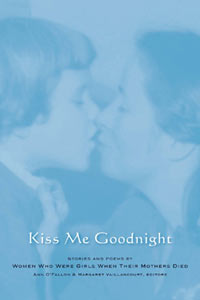Books
Kiss Me Goodnight
Stories and Poems by Women
Who Were Girls When Their Mothers Died
Introduction
If you are a child when your mother dies, the unimaginable has happened. You travel alone to a continent of grief no one else can ever find. In that land, your loneliness is complete, your longing for a mother holds you captive, sometimes for years. You are changed by that travel. You know now that disasters happen and without any warning of how deeply you will hurt. It feels as if you will hurt forever, and now you know what forever means. You are five, or seven, or thirteen, or eighteen. As have the women in Kiss Me Goodnight, you must make your way through a landscape that can never again be called normal.
Sometimes as you travel you are fearful no one will find you. You think your brief experience of a mother is unique, so that it cannot—or should not—be shared. Your shame—how could you lose your mother!—tastes like salt. Your anger at her for leaving makes you doubly ashamed. Whether she was brutal or loving, whether it happened quickly or over years. Whether you were close to her, or not; whether you did everything together, or you were the forgotten child. She is gone.
My mother’s absence changed my dreams. Things others could take for granted I would never have and could never imagine. My mother would never read my book report, buy me a party dress, watch me play hockey, meet my boyfriend, meet my life. I would never know what it’s like to talk as an adult to my mother. This created a second split, another push apart from ordinary people. So I began to write down what details I knew of her life and to imagine the details of the past I didn’t know and the future I had to survive. Though I will live always with questions, I have learned to keep writing until these words shape themselves into answers.
How grateful I am to read the strength in Kiss Me Goodnight. The women in this book have come back from that continent to give us their stories and poems, to sketch the jagged geography of grief from mother-loss. In these stories and poems, it’s clearly possible that an evil force could decapitate a father and put his head in the glove compartment of his truck. Why not? It’s as feasible as losing a mother. Or a daughter decides that a tragic air is best, putting it on thick, because it feels better to make it an act, and it’s easier that way, to pretend, while the anger flares like distress beacons of a sinking ship. Daughters watch other adults do strange things, throw out the mother’s belongings (but can’t a daughter keep something of hers?) or refuse permission to be a cheerleader (a mother would have given it), and a daughter’s powerlessness without a mother—even to argue with—cuts a path of despair inside her. If she’s young enough, she might become convinced there’s been a mistake, and any moment her dead mother will rise up. Only the daughter can’t believe that for long, she’s too smart, really—and as the church bell tolls, she moves from nine years old to adult. Another child talks to her mother’s inert, dying body in the hospital. She brings wild flowers and puts them in a bedside cup. She holds her hand, not worried that her mother doesn’t answer as she chatters about a neighbor’s rooster. No one has said her mother isn’t coming home—of course she is. The wild flowers will be the first thing she sees when she wakes up.
As these writers face their grief, no detail is missed, or spared, or too ugly to remember: the gurgles of illness, the smell of a sick room, the coffin, a coat, a dress—often the women speak of their mothers’ dresses, as if memory of a dress preserves a mother’s form. The value in these details comes from the enormous questioning that has only small pieces left from which to make a world.
Yet the women in Kiss Me Goodnight write beyond themselves. Uncompromising and brave, they tell us all what it’s like to survive the sadness and despair, the joy taken away and the love denied. It may sound simplistic, but grief requires grieving, which means discovering the staying power and the guts to go on, and the stories and poems in this book are the detailed road maps back to the land of the living.
One daughter bakes a pie and feels her mother’s hands helping her, though they had never baked a pie together. Another daughter makes a decision to become a prison guard instead of a ballerina, and she knows that her mother would have applauded her choice, even after the investment in dance lessons. If only her mother had known.
This is a chronicle of the courage of women whose despair becomes not a sentimental love, but a love that holds life and death together. I hope these poems and stories will give courage to others lost on the continent of grief, whether because of a mother’s death, or that of a spouse, a sibling, a child. These daughters are the storytellers who will guide your journey back.
Anna M. Warrock
Somerville, Mass.
